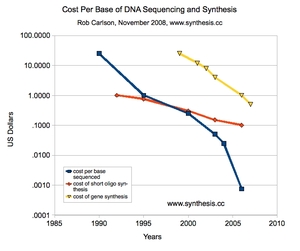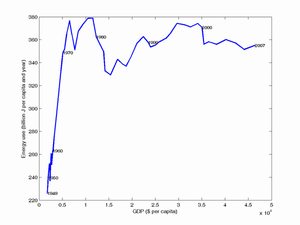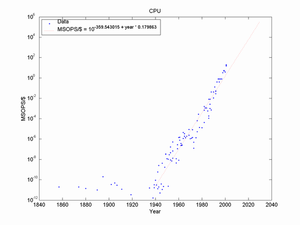February 02, 2009
The knees of Carlson's, Smart's and Moore's laws

Gene Synthesis Cost Update by Rob Carlson shows an interesting update of his earlier graphs of the cost of sequencing and gene synthesis. His "law(s)" remain on track, with gene sequencing costs per base pair declining about 0.3 orders of magnitude per year and gene synthesis going down perhaps 0.2 orders of magnitude per year. It seems that short oligo synthesis is the slowest to improve, just declining one order of magnitude in ~15 years. So is this going to be the future bottleneck on the synthesis side?
The rapid decline of sequencing cost means that in the future gene fingerprinting of food (what species was it? is it GMO? any harmful bacteria?), the environment (what species are around?) and people is very likely.
But then again, one should never trust just a graph. Here is a favourite plot of mine, US energy use per capita (vertical) vs. US GDP per capita (I saw it in a presentation by John Smart). Up until 1973 it was an amazingly straight (or even exponential) curve. One can easily imagine an economist predicting a firm relationship between energy use and GDP. Then the curve suddenly turned on a dime and became roughly horizontal for the next 35 years.
What happened at the knee of the curve was the oil crisis, which suddenly made energy usage price-limited. Despite a continuing rise in living standard (the continuing rightward move in the plot) energy use remained essentially constant thanks to less waste, technological improvements etc.
The interesting aspect is that the knee in the curve was to my knowledge not predicted beforehand, and was likely inconceivable in the previous period - a bigger economy *obviously* needs more resources! (many people clearly think so today, too.)
Even Moore's law has a knee! Using Bill Nordhaus data I got this picture:
Here the knee was the introduction of the electronic and/or programmable computer, triggering exponential growth. The fun thing with Moore's law is that here people have been arguing since day one that it will end (Moore himself suggested that it would end in his 1965 paper) but it has refused to budge. Perhaps because it is too *useful* to be given up: people will do their best to drive it further.
This suggests that Carlson's laws will persist for a long while, they have strong support (unlike the energy/GDP relation, which nobody truly cared about) and finds new uses (which is largely why computers took off).
But we should remember that past experience also suggests that inconceivable knees can show up with surprising speed.
Posted by Anders3 at February 2, 2009 08:48 PM
